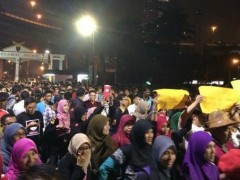Berita

Is thinking in local universities critical enough?
Tarikh : 20 October 2018
Dilaporkan Oleh : Muhammad Ataur Rahman
Kategori : News
Tweet This
Effective teaching of this subject requires critical analysis of many things in life, including the harsh conditions that emerge beyond campus, writes Mustafa K Anuar.
The recent tiff between student activists and an International Islamic University of Malaysia (IIUM) academic over the appointment of Education Minister Maszlee Malik as its president seems to suggest that so-called critical thinking among certain academics may be in a critical state.
In fact, it begs the question as to why on earth has the academic concerned been assigned to teach critical thinking when his own thinking appears to be anything but critical.
IIUM academic Abdul Naser Abdul Rahman categorised the demonstrating students as “cows” for having staged a protest against Maszlee instead of having a debate with him on this same issue.
While having a debate and discussion is and should be part of
academic culture and freedom of expression, whicht even Maszlee himself
claims to support, staging a protest is equally legitimate and part of
the democratic process.
Street protests are more visible and have the added advantage of getting the attention of the media and the public, especially on an issue that is as vital as Maszlee’s appointment, which is rightly considered by the students and others as having implications of a conflict of interest.
To be sure, street demonstrations are part and parcel of student politics that should be enshrined within the larger framework of university autonomy.
Student activist Asheeq Ali Sethi Alivi asked a legitimate and probing question: why did academics, such as Naser not raise a hue and cry when fellow academics wittingly or unwittingly submitted themselves to the wishes of certain politicians that ran counter to the interests of the students and universities concerned.
In the past, certain academics had no qualms about doing the bidding of aspiring and ambitious politicians to the extent of jeopardising academic freedom and excellence and the collective interests of academic institutions in the country.
Hence, the concerns of these students and other academics that the political appointment at IIUM might have unsavoury implications, which then would serve as a bad example for other academic institutions to follow or even justify.
This episode also points to another question: is the teaching of ‘critical thinking’ in public universities as a whole equally questionable as the one taught at IIUM? If it is so, then soul-searching is required immediately in the institutions concerned.
Effective teaching of this subject requires critical analysis of many things in life, including the harsh conditions that emerge beyond campus. If anything, the realities of the larger society should provide rich teaching material to tease the minds of students.
We cannot emphasise enough the importance of critical thinking, especially among students as it has deep implications on their future careers and more importantly, the future of the country. At the very least, we don’t want our students to become a group of people who can be easily herded into narrow thinking and bigotry or doing things without much critical reflection.
It is scary enough for us to learn that not too long ago, an academic at a public university in the north of Peninsular Malaysia admitted publicly that he was easily influenced by a book he read and, as a result, he insisted that the book be banned. But then, this shocked response of ours might have developed based on a misplaced presumption that all academics in local universities are more critical and cleverer than even some of their students.
Nothing could be more critical than boosting critical thinking on campus.
Detail news at: https://aliran.com/web-special...








